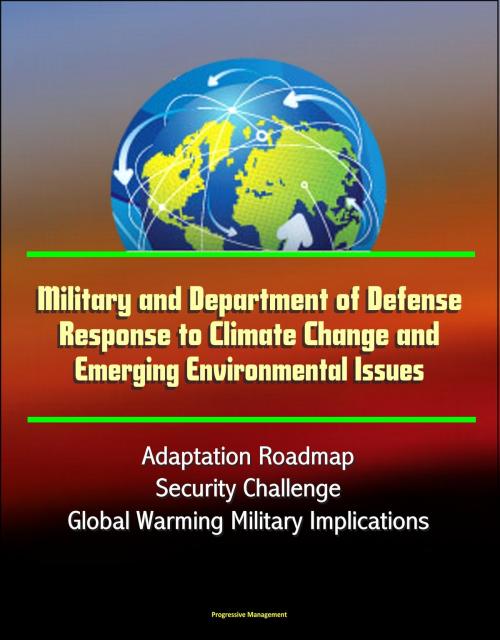Military and Department of Defense Response to Climate Change and Emerging Environmental Issues, Adaptation Roadmap, Security Challenge, Global Warming Military Implications
Nonfiction, Science & Nature, Science, Earth Sciences, History, Military, United States| Author: | Progressive Management | ISBN: | 9781311403254 |
| Publisher: | Progressive Management | Publication: | March 6, 2015 |
| Imprint: | Smashwords Edition | Language: | English |
| Author: | Progressive Management |
| ISBN: | 9781311403254 |
| Publisher: | Progressive Management |
| Publication: | March 6, 2015 |
| Imprint: | Smashwords Edition |
| Language: | English |
This professionally-formatted free-flowing ebook provides exceptional coverage of the response of the military and the Department of Defense (DoD) to environmental changes, climate change and global warming. Contents include: Worldwide Emerging Environmental Issues Affecting the U.S. Military * How Should the Department of Defense Approach Environmental Security Implications of Climate Change * Report of the Defense Science Board Task Force on Trends and Implications of Climate Change for National and International Security * The Department of Defense and Climate Change: Initiating the Dialogue * Climate Change Implications to the Global Security Environment, U.S. Interests, and Future Naval Operations * Department of Defense 2014 Climate Change Adaptation Roadmap * Taking Up The Security Challenge of Climate Change * Military Implications of Global Warming.
Changes in climate patterns and their impact on the physical environment can create profound effects on populations in parts of the world and present new challenges to global security and stability. Failure to anticipate and mitigate these changes increases the threat of more failed states with the instabilities and potential for conflict inherent in such failures.
Among the future trends that will impact our national security is climate change. Rising global temperatures, changing precipitation patterns, climbing sea levels, and more extreme weather events will intensify the challenges of global instability, hunger, poverty, and conflict. They will likely lead to food and water shortages, pandemic disease, disputes over refugees and resources, and destruction by natural disasters in regions across the globe. In our defense strategy, we refer to climate change as a "threat multiplier" because it has the potential to exacerbate many of the challenges we are dealing with today - from infectious disease to terrorism. We are already beginning to see some of these impacts. A changing climate will have real impacts on our military and the way it executes its missions. The military could be called upon more often to support civil authorities, and provide humanitarian assistance and disaster relief in the face of more frequent and more intense natural disasters. Our coastal installations are vulnerable to rising sea levels and increased flooding, while droughts, wildfires, and more extreme temperatures could threaten many of our training activities. Our supply chains could be impacted, and we will need to ensure our critical equipment works under more extreme weather conditions. Weather has always affected military operations, and as the climate changes, the way we execute operations may be altered or constrained. While scientists are converging toward consensus on future climate projections, uncertainty remains. But this cannot be an excuse for delaying action. Every day, our military deals with global uncertainty. Our planners know that, as military strategist Carl von Clausewitz wrote, "all action must, to a certain extent, be planned in a mere twilight." It is in this context that DoD is releasing a Climate Change Adaptation Roadmap. Climate change is a long-term trend, but with wise planning and risk mitigation now, we can reduce adverse impacts downrange.
This professionally-formatted free-flowing ebook provides exceptional coverage of the response of the military and the Department of Defense (DoD) to environmental changes, climate change and global warming. Contents include: Worldwide Emerging Environmental Issues Affecting the U.S. Military * How Should the Department of Defense Approach Environmental Security Implications of Climate Change * Report of the Defense Science Board Task Force on Trends and Implications of Climate Change for National and International Security * The Department of Defense and Climate Change: Initiating the Dialogue * Climate Change Implications to the Global Security Environment, U.S. Interests, and Future Naval Operations * Department of Defense 2014 Climate Change Adaptation Roadmap * Taking Up The Security Challenge of Climate Change * Military Implications of Global Warming.
Changes in climate patterns and their impact on the physical environment can create profound effects on populations in parts of the world and present new challenges to global security and stability. Failure to anticipate and mitigate these changes increases the threat of more failed states with the instabilities and potential for conflict inherent in such failures.
Among the future trends that will impact our national security is climate change. Rising global temperatures, changing precipitation patterns, climbing sea levels, and more extreme weather events will intensify the challenges of global instability, hunger, poverty, and conflict. They will likely lead to food and water shortages, pandemic disease, disputes over refugees and resources, and destruction by natural disasters in regions across the globe. In our defense strategy, we refer to climate change as a "threat multiplier" because it has the potential to exacerbate many of the challenges we are dealing with today - from infectious disease to terrorism. We are already beginning to see some of these impacts. A changing climate will have real impacts on our military and the way it executes its missions. The military could be called upon more often to support civil authorities, and provide humanitarian assistance and disaster relief in the face of more frequent and more intense natural disasters. Our coastal installations are vulnerable to rising sea levels and increased flooding, while droughts, wildfires, and more extreme temperatures could threaten many of our training activities. Our supply chains could be impacted, and we will need to ensure our critical equipment works under more extreme weather conditions. Weather has always affected military operations, and as the climate changes, the way we execute operations may be altered or constrained. While scientists are converging toward consensus on future climate projections, uncertainty remains. But this cannot be an excuse for delaying action. Every day, our military deals with global uncertainty. Our planners know that, as military strategist Carl von Clausewitz wrote, "all action must, to a certain extent, be planned in a mere twilight." It is in this context that DoD is releasing a Climate Change Adaptation Roadmap. Climate change is a long-term trend, but with wise planning and risk mitigation now, we can reduce adverse impacts downrange.















